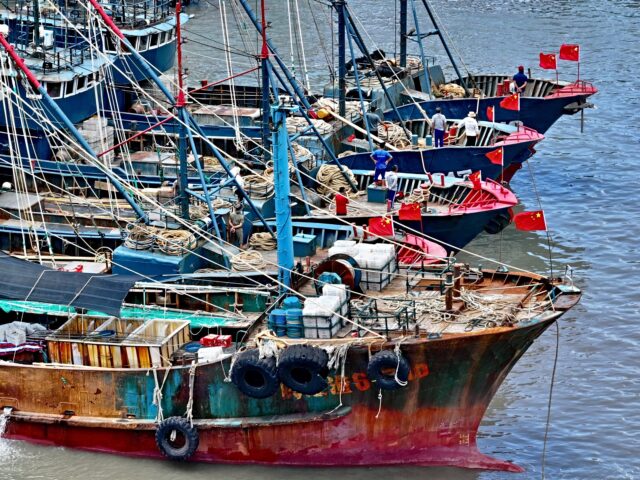Report: Illegal Chinese Fishing Causing $800 Million in Damages in Peru
Illegal Chinese fishing vessels are causing close to $800 million in yearly damages to Peru’s fishing sector while threatening the country’s natural maritime resources, the Argentine-based outlet Infobae reported on Monday.
Every year, hundreds of illegal Chinese fishing vessels sail around Latin American waters, causing mass depredation and pillaging of local fish stocks in clear violation of international maritime law and the fishing regulations of each affected country. Often, the illegal Chinese vessels often dump their manmade waste in the ocean, polluting the sea.
Their predatory practices often pose a great danger to heavily protected species such as the Patagonian toothfish. In March 2024, Argentine authorities found a Chinese boat with 163 illegally obtained tonnes of the species that reportedly amounted to $4 million in international markets at the time. In that same month, Argentina’s Navy intercepted and boarded another Chinese fishing vessel caught attempting to illegally fish inside the nation’s Exclusive Economic Zone (EEZ).
Infobae explained in its report that Peru’s EEZ overlaps with one of the most productive biological areas on the planet, stressing that, in recent years, the area has come under increased pressure from large-scale industrial fishing fleets. Hundreds of vessels often sail near its maritime borders without clear controls.
Based on international studies, around 20 percent of all fish caught in the world come from the Humboldt Current, a marine ecosystem also known as the Peru Current located along the Western South American coast. The Current is of high strategic importance for Peru due to its natural productivity and for the economic impact it has for the country’s fishing industry.
🇨🇳🇵🇪 | Los puntos rojos muestran los barcos pesqueros chinos invadiendo la ZEE de Perú en 2024
— AlertaNewsPlus (@AlertaNewsPlus) November 24, 2025
525 barcos chinos en aguas peruanas, mientras que el propio Perú apenas contaba con 239
pic.twitter.com/pJhHilwuIs
Fishing experts pointed out to Infobae that China controls the world’s largest distant-water fishing fleet and maintains continuous activities in waters near the Peruvian EEZ. Unnamed groups defending the Peruvian sea reportedly mentioned to Infobae that China’s advance in their nation’s waters is related to the “reduction of resources in their own seas,” which they summarized as “the greedy pirates of China emptied their own seas and are now hijacking the livelihoods of fishermen from other nations.”
Records submitted to Peruvian fishing industry entities reportedly indicate that 1,359 vessels operated within 500 nautical miles of Peru throughout 2024. Of the total, 525, or 38 percent, were of Chinese origin, followed by 370 Ecuadorian and 239 Peruvian. The outlet explained that the disparity in the number of vessels was marked by both the “volute and the industry capacity of the fleets.”
Alberto Ego Aguirre, the head of the Maritime, Port, and Customs Affairs Commission of the Lima Chamber of Commerce (CCL), explained to Infobae that illegal fishing of “Pota,” the local colloquial name for Humboldt squid, “carried out mainly by Chinese-flagged vessels” in Peruvian waters is a threat to the nation’s fishing industry that leaves yearly damages of around $800 million.
“If we convert that half a million tons [extracted by foreign vessels] into a final product, it amounts to 150,000 tons. At export value, we are talking about nearly $800 million that Peruvian companies are losing in revenue,” Aguirre explained to Infobae, and stressed that “Our friends from China do not pay any fees, taxes, or anything else.”
Aguirre further detailed that between 200 and 300 vessels, “mainly Chinese,” repeatedly operate in the same area, with frequent incursions within 200 miles of Peru’s EEZ that further affect the nation’s normal fishing activity.
The representative said that CCL proposed raising the level of response from the Peruvian state against illegal fishing with measures such as stricter enforcement, confiscation of vessels, suspension of logistical services, and diplomatic notes. All such policies, Infobae pointed out, were similarly implemented in Chile and Argentina, where their respective maritime authorities ordered the immediate seizure of vessels caught illegally fishing. Aguirre said that the lack of proper surveillance facilitates unfair competition towards national fishermen who much comply with strict bans and regulations.
Satellite imagery from 2024 seen by Infobae revealed that a massive displacement of Chinese fishing vessels near the Peruvian EEZ, which, according to the outlet, coincides with reports from Peruvian fishing industry associations questioning the lack of effective surveillance practices.
“The data confirmed a notable imbalance between the presence of foreign fleets and the number of Peruvian vessels authorized to operate in the same area.” Infobae explained.
Peruvian fishing unions have warned that the situation poses a direct impact on local activity, as now the legitimate fishing of Humboldt squid is no longer guaranteed for thousands of families in Peru’s north coast, in addition to the “feeling of vulnerability” from private sector fisheries, who denounce that fishing competition does not take place under equal or transparent conditions.
“At the same time, technical experts insisted that the country faces a structural challenge: the ability to monitor its own maritime space. According to specialists, the absence of a national satellite monitoring system under state control has encouraged the irregular entry of foreign fleets,” Infobae’s report read.
Christian K. Caruzo is a Venezuelan writer and documents life under socialism. You can follow him on Twitter here.
Source: Breitbart






